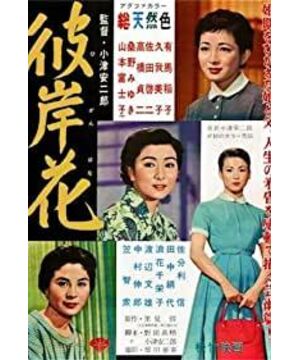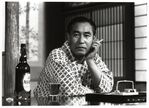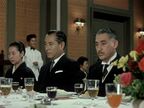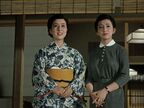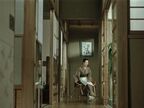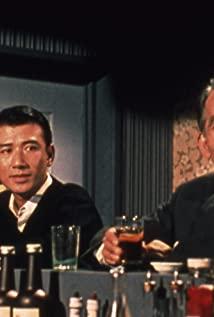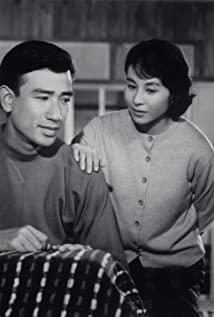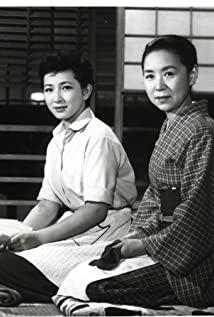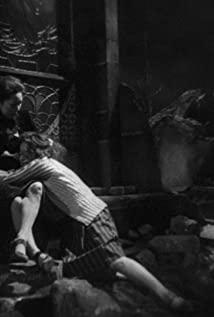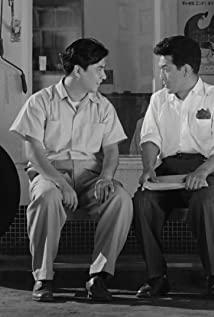In Ozu's films, those who are extremely sensitive to the cold reality and want to reminisce about the good times are always men. Compared with sentimental men, women are always rational and cold individuals. In "The Flower of the Other Shore", when the wayward father interferes, the mother shows a character attribute more like an elder. There is a scene in the play that vividly explains this kind of character arrangement: Yukiko set a trap and told Setsuko's father the same experience she had with Setsuko (and the previous scene where Yukiko and Setsuko agreed to help each other) A causal connection), when the father expressed his approval of her actions, Yukiko beheaded and then showed the gesture of the father to the three women (including the mother and sister) of Setsuko. However, when the father returned home to face the smiling and contented mother (she did not approve of the marriage at first), he regretted his statement. The reason was of course that Yukiko was not a daughter. As a bystander, he could easily The statement, for the statement of the biological daughter, can not be successfully completed, which contains ambivalence. However, the reason for this is not understood, especially the mother, so in the dialogue between the two, the dissatisfaction of both sides gradually escalated. When the father said that he would not go to his daughter's wedding, the mother really started to get angry, so she said that if the father did not go, he would not go, the psychological change of the father at this time was even more intriguing, and he became anxious instead. In fact, the father has always been reluctant to screw up his daughter's marriage, but just wants to be able to "act like a spoiled child" for the last time before his daughter leaves the house. The rational mother didn't realize it at this time, or she realized it, but the father's easy words not to go to the wedding were too much for her to tolerate the father's child psychology. So she got really angry, and at first she decided to throw her hands away, but she still came back, put away her smile, and sat upright. With a serious face and downcast eyes, the father kept looking up at the mother. This subtle relationship of strength and weakness formed in the sight is also reflected in the dialogue. The mother, in contrast to the meek tone, spit out the lessons she was about to say like a typewriter. She blamed her father for "saying one thing and doing another." You can imagine how majestic and rational she is. However, in the face of such a scolding question, my father took a light-hearted answer: "Parents all over the world are like this, how can you say one thing and do another." In the mother's view, the "very absurd" behavior is a testament to the sentimental psychology of the father. At the beginning, he even questioned his mother willfully like a child: "When did you stand on their side." And the mother's answer - "It's not a question of whose side you are on.
Older women are always a paternalistic, cold and rational gesture in Ozu's films. Maybe this is related to his personal experience. He can still live with his old mother when he is an adult. Maybe Ozu also often disagrees in words and actions. Mother coquettish. And the mother may always be unaware of the child's soft heart in an irritating gesture. So the old mother in "Tokyo Story" died first, and her death was the death of the real parent, which made the whole film lose the sense of security brought by authority, and the sadness of the old father was even more sad-he lost forever to act like a spoiled child Object. In "Late Spring" or "The Taste of Saury", the mother is simply absent, and the father faces his own contradictory situation; Carrying out the principle of rational behavior, their existence makes men have to look for coquettish objects outside the family. In "The Flowers of the Other Side", a group of old men sing songs to mourn the integrity of the family taken away by their daughter's marriage. All the old men sit around and sing, like a group of warriors who are experiencing weathering, which is both sympathetic and funny. This kind of funny is not the psychological reaction when you watch the circus performance, but the psychological reaction when you see a child showing self-pity that is still not understanding of the world, and you want to comfort him. eager.
Through his films, Ozu shows us more or less the sense of security of his own happiness, and women are often the source of security. No matter how contradictory the father is, the mother is always the most sober decision-maker. When the father cannot make a rational decision, she is the adjuster of the entire order. At first, her decision to marry her daughter was subordinate to her father. Ozu showed a laudable and habitual affirmation of traditional women. However, when she saw how irrational and willful her father's decision was, she acted as a real The elders and decision makers let the father's friends be the lobbyists. The mother's behavior is not expressed through direct description. However, when we see the confused expression of the father when facing his friends, it seems that we see a child who is not valued by adults. Annoyed, the mother's reaction was somewhat unintelligible to the father. Her father's reminders were evasive answers in the face of reproach and questioning, and reluctance to order her mother to turn off the radio. The mother's smile when she turned off the radio put aside her previous anger. As an elderly woman, the mother tolerated her father's waywardness through this meaningful smile, and exposed her understanding of her father's behavior. In her eyes, A father as a man is just a child.
However, the father was still not satisfied. He needed a companion who could immerse himself in the conflicting emotions and find the pleasure that was both distressing and sweet. In "The Taste of Saury", the old father always goes to the tavern that no one cares about when his feelings are frustrated. The reason why he frequents it is definitely not that the wine here is better than others. , but he needs to find an object who can accept his coquettishness in a straightforward way. For these men, strangers or friends are always more suitable to play their roles than relatives. Setsuko's father found a group of men who had the same situation and mood as him. Each of them is going through the pain of marrying a daughter, and one of them has seven daughters. When the man with seven daughters was mocked by his peers, he was helpless and taciturn. It was a kind of silence after repeated torture, and his peers who laughed at him, even though they knew his situation, still pressed him about what he was doing. Several daughters, this is obviously a joke, and the other party is not angry, but cooperates to respond as it should, which should also be regarded as a kind of coquetry. And when the men sing together around the table, it is the most emotional and harmonious moment in the film. At this moment, all the (men) men found what they were looking for. In addition, the direct depiction of traditional art that often appears in Ozu's films can be seen as the protagonist's effort to find a past that makes him feel stable and can act like a spoiled child.
View more about Equinox Flower reviews


